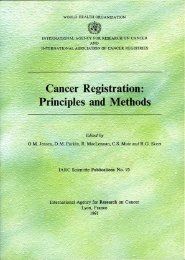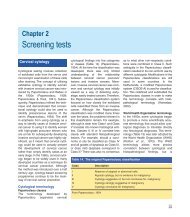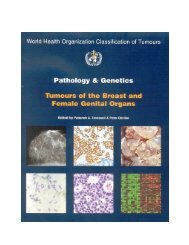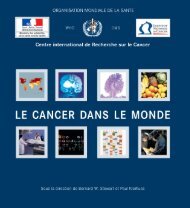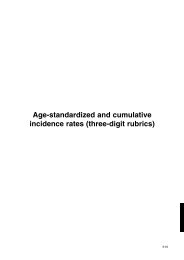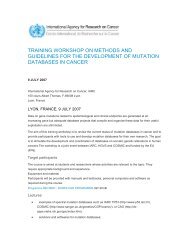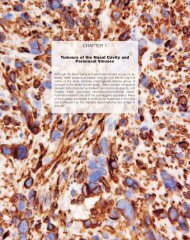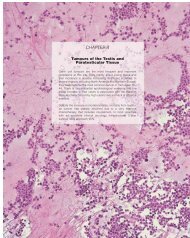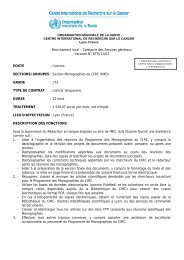world cancer report - iarc
world cancer report - iarc
world cancer report - iarc
Create successful ePaper yourself
Turn your PDF publications into a flip-book with our unique Google optimized e-Paper software.
SURGICAL ONCOLOGY<br />
SUMMARY<br />
> Surgical oncology is emerging as a specialist<br />
discipline; recent advances include<br />
more precise identification of the tumour<br />
margin, leading to reduced local recurrence.<br />
> New technology has facilitated minimal<br />
invasive surgery, laparoscopy and fibreoptic<br />
endoscopy.<br />
> The greatly elevated <strong>cancer</strong> risk in individuals<br />
with familial <strong>cancer</strong> syndromes<br />
increasingly raises the prospect of preventive<br />
surgery, e.g. mastectomy in carriers of<br />
BRCA1/2 mutations and colectomy in<br />
patients with familial adenomatosis coli.<br />
> Surgical management is underpinned by<br />
recognition of the whole patient, and not<br />
merely focused on tumour excision.<br />
Although surgery for <strong>cancer</strong> was available<br />
for many years prior to the advent of other<br />
therapies, the discipline of surgical oncology<br />
is not yet recognized in all countries as<br />
a speciality. Rather, surgical oncology is a<br />
concept which has developed recently,<br />
evolving with the emergence of radiotherapy<br />
and chemotherapy as separate modalities<br />
(Radiotherapy, p277 and Medical oncology,<br />
p281). The surgeon, who in the<br />
past was performing solo in the treatment<br />
of patients with <strong>cancer</strong>, has now become<br />
part of a team of players working together<br />
in a complex programme of multimodal<br />
anti<strong>cancer</strong> therapies.<br />
Since a surgical oncologist cannot hope to<br />
master the whole field of solid <strong>cancer</strong>s,<br />
especially in view of the high technical<br />
demands of such surgery, subspecialization<br />
in organ-based groupings, such as upper<br />
gastrointestinal and colorectal subspecialities,<br />
has become necessary. Hyperspecialization<br />
into hepato-pancreato-biliary, endocrine<br />
and vascular surgery has also developed.<br />
Tentative attempts to develop proce-<br />
272 Cancer management<br />
dure-based subgroupings, with new specializations<br />
for surgeons devoted to one type of<br />
procedure, such as organ transplantation or<br />
video laparoscopy, have generally failed.<br />
There is now a tendency to recruit surgeons<br />
who focus on one, or a few, organ sites.<br />
These specialists bring with them not only<br />
basic knowledge of the biology of <strong>cancer</strong><br />
but the ability to participate in multidisciplinary<br />
research and to collaborate with colleagues<br />
from other disciplines.<br />
However, with the growing evidence that<br />
<strong>cancer</strong> is rarely an organ-limited disease,<br />
both a disease-orientated approach and<br />
an organ-orientated approach are necessary<br />
to ensure optimal care for the <strong>cancer</strong><br />
patient. Surgical oncologists have promoted<br />
the standardization of surgical practice<br />
aiming at the increase of life expectancy.<br />
Their participation in multi-centre clinical<br />
trials has provided the opportunity to<br />
compare clinical results of surgery and<br />
outcomes in the treatment of <strong>cancer</strong> [1,2].<br />
Ethical and organizational aspects<br />
Treatment of patients with <strong>cancer</strong>, of all<br />
ages, requires a specific ethical and psychological<br />
approach. Most patients move<br />
through a state of denial and later<br />
acceptance as the diagnosis and treatment<br />
of the disease progresses. A decision<br />
to perform surgery may be made<br />
when the disease has already adversely<br />
affected the quality of the patient’s life.<br />
Cancer is often considered as a mutilating,<br />
self-destructive process and surgery<br />
is viewed frequently as either a last<br />
chance salvage procedure or an additional<br />
insult to a ravaged body. Thus, from<br />
the patient’s perspective, the prospect of<br />
surgery is seen as a new burden, but also<br />
a chance of cure. Surgeons involved in<br />
the care of <strong>cancer</strong> must help patients to<br />
regain their autonomy in decision-making<br />
and self-determination. This insight has<br />
value as a prelude to obtaining informed<br />
consent for surgery and particularly<br />
before proposing to a patient that he or<br />
she should enter a clinical trial. In practice,<br />
patients often have greater confi-<br />
Fig. 6.1 Surgery can cure patients with solid<br />
tumours when the tumour is confined to the<br />
anatomic site of origin.<br />
Fig. 6.2 A patient undergoing electrolysis treatment<br />
for an unresectable liver tumour. Two platinum<br />
electrode catheters deliver a low dose electric<br />
current causing local tumour ablation.<br />
dence in a well-structured and coordinated<br />
multidisciplinary team than in a single<br />
physician.<br />
The changing relationship between<br />
patients and surgeons due to the dissemination<br />
of knowledge and to public




